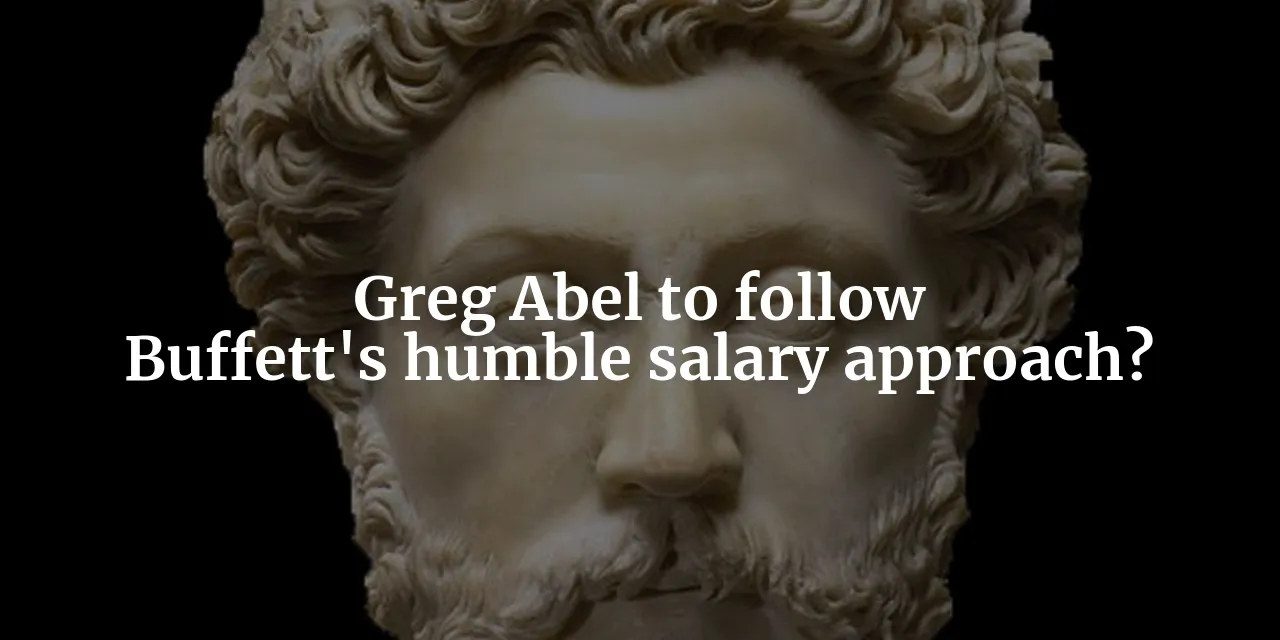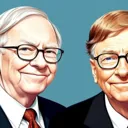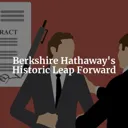Tags: Warren Buffett / Greg Abel / Comments
This fanpage is not officially affiliated with Berkshire Hathaway: Disclaimer
Let's delve into the intriguing world of executive compensation as we explore whether Greg Abel might follow in Warren Buffett's humble salary footsteps. Discover how Abel's decisions could shape the future of Berkshire Hathaway and redefine corporate leadership. Join us on a journey of values, principles, and the legacy of two remarkable leaders.

Introduction
In 2021, the business world watched as Warren Buffett, the legendary investor and CEO of Berkshire Hathaway, named Greg Abel as his designated successor. This announcement wasn't just a passing of the torch; it was a signal to the financial world that Berkshire Hathaway's future was in capable hands. Yet, amidst the discussions of leadership transition, a fascinating question emerged: Will Greg Abel ever reach—or rather, reduce to—Warren Buffett's modest $100,000 salary? This question is not trivial. In an era where CEO compensation often reaches astronomical figures, with some U.S. CEOs earning over $200 million a year 7, Warren Buffett's salary has remained a notable exception. For over 40 years, despite amassing a net worth of about $120 billion, Buffett has drawn an annual salary of just $100,000 from Berkshire Hathaway 3.
This stark contrast raises important considerations about corporate governance, executive compensation, and shareholder value. It also places Greg Abel's potential future compensation under scrutiny. Will Abel align with Buffett's philosophy, setting a precedent in an industry where excessive CEO salaries are increasingly criticized? Or will the pressures of modern corporate leadership lead to a different path?
This article sets the stage for a detailed exploration of Greg Abel's career, his compensation, and how it might align—or diverge—from Buffett's longstanding approach. By examining Abel's trajectory and achievements, alongside the broader context of rising CEO salaries in the U.S., we engage in a thought experiment about the character of Berkshire Hathaway's next leader and his potential actions for the good of the company and its shareholders.
Greg Abel's Career Trajectory and Achievements
Greg Abel's journey to the upper echelons of Berkshire Hathaway is a testament to his skill, strategic vision, and leadership. Starting his career as an accountant, Abel's path mirrors the humble beginnings of Warren Buffett himself. After graduating with a degree in commerce in 1984 and working at PricewaterhouseCoopers, Abel joined CalEnergy in 1992, marking the beginning of his ascent in the energy sector 12. This move was pivotal. When CalEnergy acquired MidAmerican Energy and Berkshire Hathaway took a controlling interest in 1999, Abel's leadership qualities came to the forefront, eventually leading to his role as CEO of the company, later renamed Berkshire Hathaway Energy 12.
Under Abel's stewardship, Berkshire Hathaway Energy flourished, showcasing his ability to lead and expand a major subsidiary of Berkshire Hathaway ↗. His role expanded in 2018 when he was named vice chair of Berkshire Hathaway's non-insurance operations, further solidifying his influence within the conglomerate 12 ↗. Abel's leadership style and strategic acumen have not only been praised by Charlie Munger but also by Warren Buffett himself, who in a press release stated that Berkshire has the right CEO in Abel to succeed him 1.
Abel's career trajectory is not just a series of titles and roles. It reflects a deep commitment to the values and principles that have made Berkshire Hathaway a unique entity in the corporate world. His strategic acquisitions and the growth of Berkshire Hathaway Energy under his leadership are indicative of a forward-thinking, innovative approach that aligns with Buffett's legacy of value creation.
Moreover, Abel's financial success and commitment to Berkshire Hathaway are evident. His net worth, estimated at $484 million in 2021, and his significant investments in Berkshire Hathaway, including the purchase of 168 Class A shares worth approximately $68 million in October 2022, demonstrate a profound stake in the company's future 2. This financial commitment, coupled with his recognition in the business world, including receiving a Horatio Alger award in 2018, positions Abel not just as a leader within Berkshire Hathaway, but as a notable figure in the broader business community 2.
As we delve into the nuances of Greg Abel's career and achievements, it becomes clear that his journey is not only about reaching the top but also about how he aligns with the ethos of Berkshire Hathaway. His trajectory from an accountant to the designated successor of Warren Buffett encapsulates a blend of strategic growth, principled leadership, and a deep commitment to the company's long-term success. As shareholders and observers alike ponder the future of Berkshire Hathaway under Abel's leadership, his past achievements offer a compelling glimpse into a future that, while uncertain, is undoubtedly promising.
What Warren Buffett had to say about Greg Abel at Berkshire's annual shareholder meeting 2023 is nothing short of remarkable as well:
Warren Buffett's Compensation Philosophy
Warren Buffett, the Oracle of Omaha, has long been celebrated not just for his unparalleled investment acumen but also for his unique approach to executive compensation. For over four decades, Buffett has maintained a modest annual salary of $100,000, a figure that pales in comparison to the astronomical sums earned by his peers at the helm of other leading corporations 3. This decision is not a mere gesture of humility but a deeply ingrained philosophy that champions long-term success over short-term gains. Buffett's rationale is clear: CEOs should be incentivized to prioritize the enduring prosperity of their companies rather than fleeting financial achievements.
Buffett's modest lifestyle is an extension of his compensation philosophy. Despite his substantial net worth, he resides in the same five-bedroom house he purchased in 1958 for $31,500 and drives a decade-old car 6. This frugality is emblematic of a belief system that eschews extravagance in favor of simplicity and efficiency, qualities that have underpinned Berkshire Hathaway's culture and governance.
Moreover, Buffett's stance on executive compensation is not just about personal choice but also about setting a precedent for corporate America. He believes that CEOs ought to be sufficiently wealthy to work for the love of the job rather than for a paycheck. This perspective is starkly contrasted with the median pay for S&P 500 CEOs, which dropped to $14.5 million in 2022, highlighting the vast disparity between Buffett's earnings and those of his counterparts 7:
| CEO | Company | Total Compensation 2022 |
|---|---|---|
| Stephen Schwarzman | Blackstone | $253 million |
| Sundar Pichai | Alphabet | $226 million |
| Stephen Scherr | Hertz | $182 million |
| Barry McCarthy | Peloton | $168 million |
| Michael Rapino | Live Nation | $139 million |
| Safra Catz | Oracle | $138 million |
| Douglas Ingram | Sarepta Therapeutics | $125 million |
| Bill Ready | $123 million | |
| Kiwi Camara | CS Disco | $110 million |
| Tim Cook | Apple | $99 million |
| Warren Buffett | Berkshire Hathaway | $0.1 million |
Buffett's commitment to philanthropy further underscores his belief in the importance of giving back to society. Having pledged over $100 billion to the Bill & Melinda Gates Foundation, Buffett exemplifies how wealth can be leveraged for societal good rather than personal luxury 4. His approach to compensation has significantly influenced perceptions of executive pay, advocating for a model that values long-term impact over immediate reward.
Executive Compensation Trends in the U.S.
The landscape of executive compensation in the U.S. has undergone significant transformation, with some CEOs commanding salaries and bonuses that reach well into the hundreds of millions. In 2022, the CEO of Blackstone, Stephen Schwarzman, topped the list with a total compensation of $253 million, while Sundar Pichai of Alphabet earned $226 million 7. These figures represent a stark departure from the ethos embodied by Warren Buffett and underscore the growing divide in executive pay.
The factors contributing to this surge in CEO compensation are multifaceted, encompassing company performance, stock options, and board decisions. A noteworthy aspect of modern executive pay packages is the heavy reliance on stock options and bonuses, designed to align the interests of CEOs with those of shareholders. However, this alignment often incentivizes short-term thinking, a practice Buffett has vocally criticized for detracting from the long-term health of a company 3, 6.
Public and shareholder reactions to these towering compensation packages have been mixed, with debates intensifying around income inequality and corporate responsibility. The contrast between the average U.S. worker's salary of about $56,000 in 2022 and the multimillion-dollar earnings of top CEOs has sparked discussions on the fairness and sustainability of such disparities 7.
Notable examples of high CEO compensation, such as those of Schwarzman and Pichai, not only highlight the financial rewards of leading global corporations but also raise questions about the impact on company culture, employee morale, and corporate image. As executive pay continues to climb, the potential for regulatory or shareholder-driven changes looms, with many advocating for a more equitable distribution of wealth within companies.
The divergent paths of Buffett's modest compensation and the lavish earnings of other CEOs encapsulate a broader debate on the values and priorities that should guide corporate leadership. As Berkshire Hathaway prepares for a transition in leadership, with Greg Abel at the helm, the question remains: will Abel's salary mirror Buffett's humble wage, or will it reflect the prevailing trends in executive compensation? The answer will not only shape the future of Berkshire Hathaway but also contribute to the ongoing discourse on the role of wealth and compensation in defining corporate success and social responsibility.
Greg Abel's Compensation and Philosophy
Greg Abel, poised to succeed Warren Buffett as CEO of Berkshire Hathaway, has a compensation history that starkly contrasts with Buffett's famously modest salary. While Buffett has maintained a salary of $100,000 for over four decades, advocating for a compensation structure that discourages short-term thinking, Abel's earnings have been significantly higher. In the past five years alone, Abel received around $100 million in total salary and bonuses, including a flat $20 million last year 6. This discrepancy raises questions about whether Abel will align his compensation philosophy more closely with Buffett's once he assumes leadership.
Abel's investment in Berkshire Hathaway shares, notably purchasing 168 Class A shares worth approximately $68 million in October 2022, signals his confidence in the company's future and a substantial personal stake in its success 2. This move can be seen as an alignment with Buffett's philosophy, where investing in the company serves as a testament to belief in its long-term potential. Buffett has praised Abel, highlighting his work ethic and alignment on deal-making and capital allocation 8, suggesting a shared value system that could extend to compensation philosophy.
Speculation arises on whether Abel might choose to reduce his salary in alignment with Buffett's example. Such a decision could stem from a desire to reinforce the cultural ethos of Berkshire Hathaway, emphasizing long-term success over short-term gains. Additionally, adopting a more modest compensation package could serve to strengthen Abel's relationship with shareholders, demonstrating a commitment to the company's values and fiscal prudence.
The implications of Abel's compensation on his leadership style, decision-making, and relationship with shareholders might be profound. A decision to align more closely with Buffett's compensation philosophy could influence Berkshire Hathaway's culture and governance post-Buffett, reinforcing a legacy of modesty, long-term thinking, and alignment of interests between executives and shareholders. However, the transition also offers an opportunity for Abel to define his own approach to compensation, potentially balancing between market expectations and the unique culture of Berkshire Hathaway.
Currently, it is believed that Greg Abel receives a compensation of $20 million 5, which is still moderate compared to companies of comparable sizes. Remember, Berkshire Hathaway currently has a market cap arount $900 billion 9. Its subsidiaries employ approximately 400,000 people in the United States and continue to establish new jobs ↗!
Greg Abel’s down-to-earth philosophy may also be evident in a report from the University of Alberta in 2013, when he was the CEO of MidAmerican Energy:
Shareholder Perspectives and Expectations
Shareholders of Berkshire Hathaway have a strong natural interest in the likely transition from Buffett to Abel, with some attention to Abel's compensation and how it might reflect on the company's future values. The stark difference between Buffett's modest salary and Abel's previous earnings has not gone unnoticed, raising questions among shareholders about the future direction of Berkshire Hathaway's compensation philosophy 8.
Shareholder confidence in a CEO's ability to maintain and grow company value is paramount, and executive compensation plays a significant role in this equation. Berkshire Hathaway's unique culture, characterized by long-term value creation and modest executive compensation, sets it apart from other corporations where CEO salaries reach astronomical figures 7 ↗. Shareholders, therefore, have high expectations for Abel to embody these principles, potentially adjusting his compensation to reflect the company's ethos more closely.
The role of shareholder votes and activism cannot be understated in shaping executive compensation policies. While Berkshire Hathaway has not faced significant shareholder dissent on this issue, the broader corporate landscape has seen instances where shareholder reactions to perceived excessive CEO compensation have led to significant pushback 7. Abel's decisions regarding his compensation could either reinforce shareholder trust and confidence or lead to scrutiny and calls for reform.
The potential impact of Abel's compensation decisions on Berkshire Hathaway's stock performance and shareholder value is a critical consideration. Shareholders will be keenly watching how Abel's approach to compensation influences the company's governance practices and, by extension, its corporate culture. Transparent communication and strategic decision-making by Abel will be crucial in maintaining shareholder trust and confidence during this transition period.
Greg Abel possibly stands at a crossroads, with the opportunity to align his compensation philosophy more closely with Warren Buffett's or to chart a new course that balances market expectations with Berkshire Hathaway's storied culture. Shareholder perspectives and expectations will play a significant role in shaping this decision, with the potential to influence the company's trajectory for years to come. Abel's actions in the near term will be closely watched, not only as an indicator of his leadership style but also of his commitment to the values that have made Berkshire Hathaway a paragon of long-term success in the corporate world.

Conclusion
The question of whether Greg Abel will align his salary with Warren Buffett's modest $100,000 wage is not just a matter of numbers; it is a reflection of values, principles, and the future direction of Berkshire Hathaway. As we have explored Abel's career trajectory, achievements, and financial commitments, it becomes evident that he embodies many of the qualities that have defined Buffett's legacy. From his strategic leadership at Berkshire Hathaway Energy to his significant investments in the company, Abel has demonstrated a deep commitment to its long-term success.
Warren Buffett's philosophy on executive compensation, characterized by humility, frugality, and a focus on long-term value creation, stands in stark contrast to the prevailing trends in CEO salaries in the U.S. Abel's decision on his compensation will not only shape Berkshire Hathaway's culture and governance but also set a precedent for other executives and companies ↗. Shareholders are closely watching how Abel navigates this decision, as it might have far-reaching implications for the company's legacy.
As Berkshire Hathaway prepares for a leadership transition, Abel has the opportunity to redefine the standards of CEO compensation, aligning it more closely with the values that have made the company a beacon of success. By balancing market expectations with Berkshire Hathaway's unique culture, Abel can set a new standard for executive compensation that prioritizes long-term success, shareholder interests, and corporate responsibility.
In the broader context of corporate governance and executive compensation trends, Abel's decision carries weight beyond Berkshire Hathaway. It has the potential to influence other executives and companies, sparking a reevaluation of compensation practices in pursuit of a more equitable and sustainable model. As we look to the future of Berkshire Hathaway under Abel's leadership, we anticipate a continuation of the company's legacy of prudence, integrity, and value creation.
In closing, let us be chrystal clear: Greg Abel is undoubtedly worth every penny of his compensation, whether it amounts to $100,000 or $20 million. Most importantly, he dedicates himself to serving Berkshire Hathaway in our best interests!
References
-
Meet Greg Abel, Warren Buffett's successor and heir apparent to Berkshire Hathaway - www.businessinsider.com ↩↩↩↩
-
Warren Buffett has earned a $100,000 salary for over 40 years. Here's a look at the billionaire investor's unique compensation. - markets.businessinsider.com ↩↩↩
-
Who Is Warren Buffett? - www.investopedia.com ↩
-
Buffett's Berkshire boosts CEO-designate Abel's pay to $20 million - www.reuters.com ↩
-
Why Warren Buffett only gets paid $100,000 a year — a fraction of his deputy's $20 million salary - www.businessinsider.com ↩↩↩
-
These are the 10 highest-paid CEOs in the U.S.—some pull in over $200 million a year - www.cnbc.com ↩↩↩↩↩↩
-
Warren Buffett's successor Greg Abel is wooing shareholders, but some questions remain - www.cnbc.com ↩↩
-
Berkshire Hathaway Inc. (BRK-B) - finance.yahoo.com ↩










